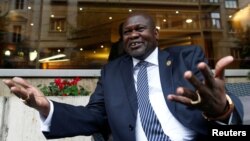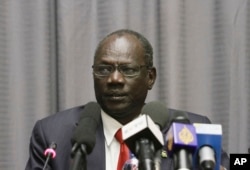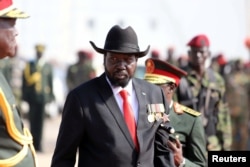Carol Van Dam contributed to this report.
JUBA, SOUTH SUDAN — Opposition leader Riek Machar is supposed to be in Juba on or before May 12 to participate in forming South Sudan's Transitional Government of National Unity as required in the September revitalized peace deal, but the SPLM-IO (Sudan People's Liberation Movement In Opposition) is not saying when Machar will get there.
Machar is to be reinstated as first vice president in the new government. A senior SPLM-IO official said security arrangements, which are due to be completed by the end of the 8-month, pre-transitional period, are far from being settled, throwing Machar's return to the capital in question.
Puot Kang Chol, who represents the SPLM-IO on the National Pre-Transitional Committee or NPTC, the body charged with implementing the peace deal, told the French news agency AFP on Wednesday that Machar will only return to Juba if security arrangements are in place.
The SPLM-IO has proposed delaying the formation of the transitional government for six months because implementation is dramatically behind schedule.
Information Minister Michael Makuei said Machar's absence will affect the formation of the new government.
"The SPLM/A-IO is a part and parcel of the agreement and we as a government, we wish if the parties could agree so that we enter a smooth transition. But of course in the absence, or one party objects and the rest are in agreement, it will be up to those, the parties to agree," Makuei told South Sudan in Focus.
Makuei said the NPTC is scheduled to meet next week to discuss whether to keep the May 12 deadline or to mutually agree on a delay for forming the new government.
Chapter two of the peace agreement requires that all the parties unify, train and deploy their various forces jointly in a period not exceeding more than eight months, which is due to end on May 12.
The deal also stipulates that all parties must agree on redefining President Salva Kiir's unilaterally imposed 32 states before forming the new government. The parties have not even touched that topic, which was one of the major stumbling blocks during the peace talks.
South Sudan Military Spokesman Major General Lul Ruai Koang confirms the parties have yet to complete the security arrangements as required in the peace agreement.
"I am afraid to tell you that we are behind schedule in terms of making all the arrangements required for the government to be formed in May 2019. The primary challenge we have had was funding," Koang told South Sudan in Focus.
Koang said the parties were expected to house, unify, train and deploy at least 110,000 troops into one, national army, police officers, and national security agents by the May deadline but most of those activities have yet to be carried out.
He said the parties have so far agreed to train and unify a joint force of 700 men and women to provide security for top officials in the new government.
The military needs at least 45 days to fast-track the training of the joint forces, Koang says, and there's not nearly enough time to do so.
"It won't be possible for the arrangements to be made in the four or five weeks. It is practically impossible. It is actually less than a month."
SPLA-IO deputy military spokesman Col. Lam Paul Gabriel says despite the challenges, the parties have made some progress in confidence building and mitigating tensions in parts of the country where sporadic fighting was still occurring.
"Much as we really have challenges, we have achieved a lot. Among them is that the permanent cease-fire is being observed by the warring parties. It is holding so far since November last year. Cantonment areas for all opposition (forces) have been identified and the establishment is ongoing."
The NPTC passed a budget of $285 million for implementation of the peace agreement; most of that — $245 million — is set aside for security arrangements. So far, the government has released about $10 million to fund security arrangements.







